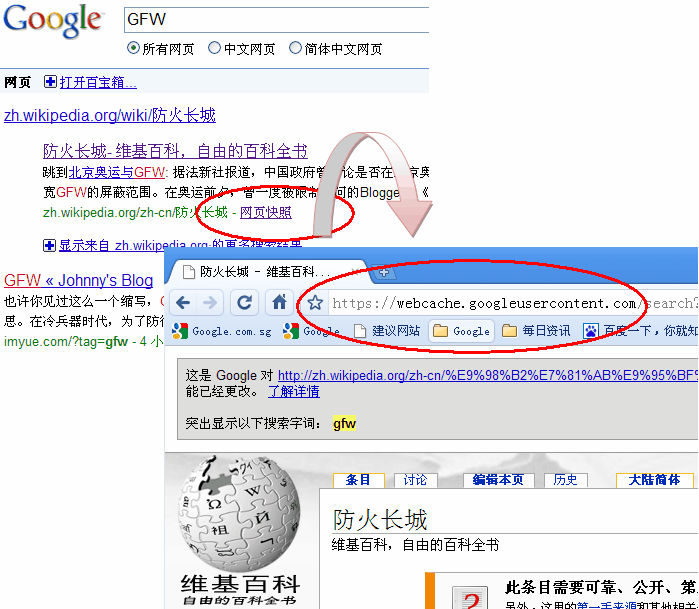Bypass Internet Censorship With HTTPS Google Webcache

Some countries like China use a filter to block information from being accessible by Internet users. But it is not only countries who filter the Internet. Organizations, companies or schools are usually also running Internet filters to block contents from being accessible in their networks.
Common options to overcome those filters is to use web proxies or caches. Internet censorship in China has advanced over the years and many solutions that worked back then no longer work.
The HTTPS Google Webcache extension for Google Chrome currently breaks most filtering systems by linking directly to the https version of Google Cache results.
A search on Google not only displays the link to the websites that are linked in the search results but also to cache results which are stored copies of those websites on Google servers.
The standard link to those cache entries is a normal http link which seems to be blocked in China. The https version, which one can test by simply adding the s to the url, does not seem to be blocked currently. The extension for Chrome basically rewrites all Google Cache links so that they automatically point to the https version.
It is likely that those links will be added to the filter eventually though. It should also be noted that this only works for pages that appear in the search engine results.
Https Google Webcache can be downloaded from the Google Chrome Extension gallery.
Update: Google has recently changed the interface of their search engine. As a result, cached links have been moved from being directly displayed on the page to another location.
You now need to move the mouse over the result that you want to access a cached version from, click on the arrows that appear, and then on the right on the Cached link that appears above the preview screenshot of the web page.
Advertisement

















This Fire Fox add-on:
https://addons.mozilla.org/en-US/firefox/addon/537/
also causes website images not to go via a httpS proxy service like https://www.startpage.com
I also use:
https://docs.google.com/viewer?url=
to view documents Word, PDF and other docs via httpS
well, now they’ll block it.
Some things are better left to good, old-fashioned word of mouth instead of going straight for the cyber megaphone.
Just a thought.
Yes and when this extension does get used the megaphone may be muted, but like a sieve it leaks web browsing history everywhere.
It only fully encrypts a text based cache of a website, all other images, adverts, scripts and rich media content is not bypassed at all. Therefore the viewing of websites via the https google cache function, seems to give a misleading sense that internet use will not end up being blocked or at least monitored.
To use effectively, it looks like image, scripts and other none text based content will need to be blocked as well.
When I use this https function my padlock sign, indication encryption is being used, displays a red warning symbol. This warning symbol only goes away when I click on the text version of the cache. Therefore the extension needs to be altered so google, by default, only displays a cache text version of a website url.
As a manual hack, I just get a plain cache link, like:
http://webcache.googleusercontent.com/search?q=cache:YRlK7uiwK3MJ:www.ghacks.net/+https://www.ghacks.net/&hl=en&gl=uk
I add the s in https, like:
https://webcache…..
I then append:
&strip=1
to the end of the url, which results in only the text fully encrypted version being displayed. Thus the resulting url is:
http://webcache.googleusercontent.com/search?q=cache:YRlK7uiwK3MJ:www.ghacks.net/+https://www.ghacks.net/&hl=en&gl=uk&strip=1
I am sure someone can come up with an automated script to do this..
Very soon we all can welcome Australia to the elite countries protecting unsuspecting users from ill advised content on the internet. See: http://en.wikipedia.org/wiki/Internet_censorship_in_Australia